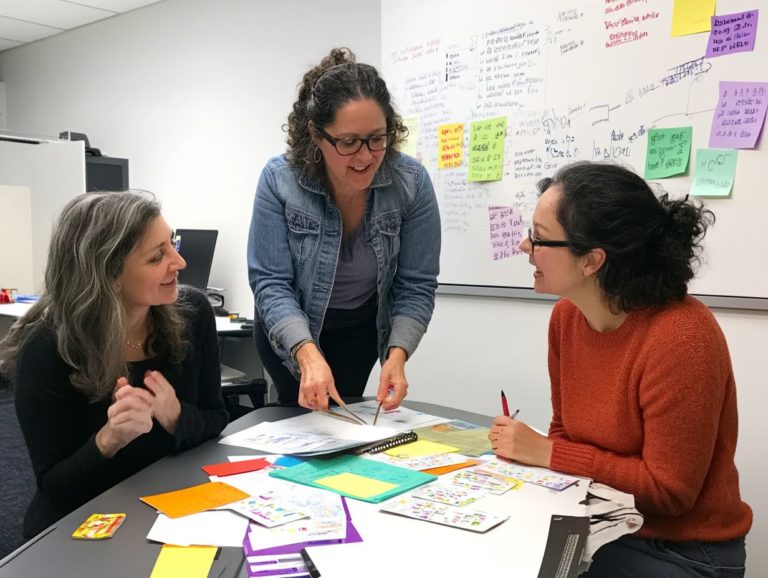using podcasts to enhance language skills
Get ready! Podcasts have revolutionized the realm of language learning, presenting a dynamic and engaging avenue for skill enhancement.
With their rich audio content, they serve as an invaluable resource for improving your listening and speaking abilities while immersing you in natural language and a variety of accents.
This article delves into the benefits of utilizing podcasts for language acquisition and offers insights on how to effectively weave them into your study routine. You’ll also find tips for maximizing your learning experience.
Whether you re just starting out or seeking to refine your skills, podcasts can truly be a game-changer on your language journey.
Contents
- Key Takeaways:
- The Benefits of Using Podcasts for Language Learning
- How to Incorporate Podcasts into Language Learning
- Supplementing with Other Learning Methods
- Maximizing Language Learning with Podcasts
- Frequently Asked Questions
- What are podcasts?
- How can using podcasts enhance language skills?
- What are some tips for using podcasts to enhance language skills?
- Are there any specific podcasts that are recommended for language learners?
- Can listening to podcasts replace traditional language learning methods?
- Can using podcasts to enhance language skills be beneficial for all ages?
Key Takeaways:

Podcasts can improve listening and speaking skills by providing exposure to natural language and accents.
Choose podcasts that align with your language level and interests, and create a listening routine to consistently practice.
Supplement podcast learning with other methods such as textbooks, writing, and vocabulary practice to maximize language learning.
The Benefits of Using Podcasts for Language Learning
Podcasts have become a transformative resource in language learning, especially for students in English as a Foreign Language (EFL) classrooms. With their engaging formats and easy accessibility, podcasts allow you to enhance your listening and speaking skills while also using social media to enhance language skills and understand different cultures and social issues.
In educational settings, integrating audio podcasts aligns seamlessly with contemporary teaching strategies that promote active learning and digital competence. By offering opportunities for you to engage with authentic language use, they not only make the learning experience more enjoyable but also equip you for real-world communication.
Improving Listening and Speaking Skills
Improving your listening and speaking skills is one of the standout benefits of incorporating podcasts into your language learning journey. By immersing yourself in these rich auditory experiences, you engage with authentic content that closely resembles everyday conversations.
Techniques like shadowing where you mimic the speakers to hone your pronunciation and rhythm can elevate your verbal skills. Don t underestimate the power of repetition; listening to episodes multiple times helps reinforce vocabulary and sentence structures in your mind.
Interactive exercises, such as discussing episode themes or summarizing content, can further enhance your comprehension and articulation. For instance, episodes of “The English We Speak” provide bite-sized insights that are ideally suited for practicing these techniques, making it enjoyable for you to elevate your linguistic capabilities.
Exposure to Natural Language and Accents
Podcasts provide you with invaluable exposure to natural language and a rich array of accents, significantly enhancing your linguistic competence. This exposure not only sharpens your listening comprehension but also arms you with the adaptability required to navigate conversations in our increasingly interconnected world.
By engaging with a variety of speakers and dialects, you become more attuned to the cultural nuances and communication styles that vary across regions. These skills are essential in fostering global citizenship, as they enable you to appreciate and interact with the diverse tapestry of cultures that shape our societies.
Ultimately, this experience elevates your cultural awareness, ensuring that you can communicate effectively and respectfully in a variety of settings.
How to Incorporate Podcasts into Language Learning
Incorporating podcasts into language learning demands a thoughtful strategy that emphasizes selecting the right content and establishing a consistent listening routine for you. Using your mobile devices makes it easy to access podcasts, allowing you to seamlessly weave language practice into your daily life.
By meticulously choosing educational podcasts that align with your curriculum goals, you can significantly enhance your engagement and comprehension. This method not only cultivates your digital competence but also encourages self-directed learning, enabling you to take charge of your educational journey.
Start exploring podcasts now and transform your language skills!
In summary, podcasts offer a unique and engaging way to enhance your language skills. They provide valuable exposure to natural language, improve your listening and speaking abilities, and help you build cultural awareness. Start incorporating them into your routine today!
Choosing the Right Podcasts

Choosing the right podcasts is essential for getting the most out of your language learning journey.
When selecting podcasts, assess the content relevance to ensure the materials align with your educational goals. The language level should match your proficiency challenging enough to stimulate growth, but not so difficult that it leads to frustration.
Engaging narratives are crucial; they capture your attention and keep your interest alive throughout the learning process.
By integrating ICT tools, you can enhance accessibility and create a more interactive experience. This ultimately fosters a richer learning environment that supports your language acquisition and retention.
Creating a Listening Routine
Establishing a structured listening routine can greatly enhance your engagement and motivation in language learning through podcasts.
Start today! By setting achievable daily or weekly goals, you can incrementally build your listening skills while becoming familiar with various accents and vocabulary.
Dedicating just 15-20 minutes each day to listen to selected episodes can lead to amazing progress over time.
This routine reinforces language retention and aids in developing critical listening strategies. Many EFL classrooms have successfully adopted consistent schedules, allowing learners to listen to native speakers dialogues twice a week, followed by engaging discussions.
Such practices have shown remarkable improvements in comprehension and speaking skills, creating a more immersive and enriching learning environment for you.
Supplementing with Other Learning Methods
Supplementing podcasts with various learning methods elevates your language learning experience to a whole new level.
By weaving together audio content with traditional textbooks and digital media, you can significantly boost your vocabulary acquisition and writing skills.
This approach fosters deeper comprehension and retention of information and caters to a variety of learning styles.
As a result, every student can engage meaningfully with language learning, ensuring that no one is left behind in the journey toward fluency.
Using Podcasts in Conjunction with Textbooks
Utilizing podcasts alongside textbooks offers an exceptionally effective reinforcement mechanism for your language learning journey.
This combination not only enhances your educational experience but also helps you grasp complex theories through engaging, real-world examples.
For instance, when a textbook chapter dives into the cultural nuances of language, educators can include a podcast episode featuring native speakers sharing insights into their daily lives and cultural practices.
By aligning podcast themes closely with textbook chapters, you can visualize and contextualize abstract concepts, making them more relatable and easier to retain.
This approach transforms passive reading into an interactive learning experience, fostering a deeper understanding and better retention of the material.
Practicing Writing and Vocabulary
Practicing writing and vocabulary through podcasts can significantly enhance your language proficiency.
Incorporating writing exercises that require you to summarize podcast episodes sharpens your comprehension skills while reinforcing new vocabulary.
Engaging with thought-provoking prompts related to the podcast content encourages deeper involvement and critical thinking.
This dual approach enables you to articulate your thoughts clearly in written form, leading to a more profound understanding of the material.
After each listening session, take a moment to jot down your reflections. This serves as a valuable comprehension check, ensuring that you re actively assimilating the information ultimately enriching your overall language development.
Maximizing Language Learning with Podcasts

Maximizing your language learning experience with podcasts demands intentional strategies like active note-taking and engaging in online discussions.
These approaches promote deeper immersion with the material, offering you valuable opportunities to reinforce your understanding and elevate your communication skills.
By cultivating an interactive learning environment, educators can foster a collaborative culture that transcends the confines of traditional classrooms, enriching your educational journey.
Taking Notes and Reviewing Episodes
Taking notes and reviewing podcast episodes are crucial practices that significantly enhance your understanding and support your skills development in language learning.
By actively summarizing the key points from each episode, you can distill the most important information, making it easier to recall later.
Jotting down new vocabulary not only enriches your language skills but also fosters a deeper understanding of context and usage.
Revisiting your notes regularly reinforces the material you ve learned, ensuring that essential concepts stick in your memory.
Engaging with the content through written reflections or discussions can further solidify your knowledge and transform the learning experience into something truly interactive.
Participating in Online Discussions and Communities
Participating in discussions and online communities related to podcast episodes not only fosters engagement but also significantly improves your communication skills as a language learner.
These platforms offer a vibrant space for you to connect with peers, share ideas, and ask questions about the podcast content, ultimately deepening your understanding.
As you exchange thoughts and ideas with others, you practice your language skills in a real-world context while creating a sense of belonging and support within a diverse community.
This collaborative learning environment encourages you to use the language naturally, empowering you to express your opinions and clarify doubts. This thrilling process boosts your confidence and sharpens your skills!
Dive into those discussions now! By participating in meaningful dialogues, you gain new perspectives, making your learning experience both enjoyable and effective.
Frequently Asked Questions
What are podcasts?
Podcasts are audio recordings or episodes that can be downloaded or streamed online. They cover a variety of topics and can be educational, entertaining, or both.
How can using podcasts enhance language skills?

Listening to podcasts in a different language can improve your listening understanding, vocabulary, and pronunciation. It also exposes learners to different accents and speaking styles.
What are some tips for using podcasts to enhance language skills?
Choose podcasts that match your language level. Listen actively by taking notes or repeating phrases. Try to listen to a variety of topics to expand your vocabulary and range of language.
Are there any specific podcasts that are recommended for language learners?
Yes, there are many podcasts specifically created for language learners, such as Duolingo podcasts, Coffee Break podcasts, and LinguaBoost. It’s also helpful to look for podcasts created by native speakers or featuring interviews with native speakers.
Can listening to podcasts replace traditional language learning methods?
No, podcasts can be a great supplement to traditional language learning methods, but they should not be the sole source of language learning. It’s important to practice speaking, reading, and writing in the language to fully develop language skills.
Can using podcasts to enhance language skills be beneficial for all ages?
Yes, podcasts can be beneficial for language learners of all ages. They can be adapted to different levels and interests, making them a useful tool for children, teenagers, and adults alike.





